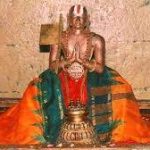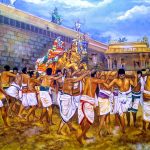Srimathe Ramanujaya Namah! Sri Sriranga Narayana Jeeyar Swamigal Thiruvadigale Saranam! Sri Velukkudi Swamigal Thiruvadigale Saranam!
adiyen have also understood these differences between the sects. However, as our Swami, quoting from his father’s speech, always says, “as long as the differences in the sects are focussed on giving importance to Vedas and ubayavedas, it is good” anything beyond is not good for the sampradayam. adiyen follows Tenkalai and personally feels that the doctrines of Tenkalai are aligning with adiyen’s thought process but is in no position to comment on which is right or which is wrong. Adiyen would like to share the following for reference.
THE ASTADASA-BHEDAS, OR THE EIGHTEEN POINTS OF DOCTRINAL DIFFERENCES BETWEEN THE THENKALAIS (SOUTHERNERS) AND THE VADAKALAIS (NORTHERNERS) OF THE VISISTADVAITA VAISNAVA SCHOOL, SOUTH INDIA
BY A. GOVINDACARYA, M.R.A.S.
Sri Govindacharya Swamy wrote extensively in English in the late 19th century and early 20th century for the benefit of the western audience at that time, but now applicable universally.
The points of difference in the doctrines (of Vadakalai and Thenkalai) are of considerable importance for the study of religion in India. The following communication from Swarm Govindacarya, himself a follower of the Thenkalai belief. It may be noted that while each school has numerous adherents in Southern India, the great majority of Vaisnavas of Northern India trace their spiritual descent from Ramananda, and profess doctrines akin to those of the Vadakalai.
Legend:
S. = South School.
N. = North School.
1. Grace of God (Prasada).
N. Say that Grace is to be earned or bought; i.e. “cooperative” (sahetuka).
S. Say that Grace comes freely. God’s grace is sovereignly free and, therefore, has no price; i.e. “irresistible” (nirhetuka).
2. Grades of Bliss in Moksa.
N. Say that there are no grades.
S. Say that some variation exists, but it is neither quantitative nor qualitative. The variation or difference arises in virtue of different duties assigned to different Muktas (i.e. freed, liberated, or salvated souls).
3. Works (Karma) and Gnosis (Jnana).
N. Say that these do not constitute direct means to attain God; but are ancillary to Bhakti. Bhakti, therefore, constitutes the direct means to Moksa ( = God-attainment).
S. Say that any of these so-called distinct means may lead to Moksa; for in each case the mental attitude of the person is the chief determinant. It is the conversion of the heart that is chiefly aimed at.
4. Nature of Sri (or Laksmi).
N. Say that Sri has essential pervasion (Svarupa-Vyapti) also, as Narayana; i.e. pervasion by essence.
S. Say that Sri has attributive pervasion (Guna-Vyapti) and corporeal pervasion (Vigraha-Vyapti), but not the essential pervasion (Svarupa-Vyapti). The Motherhood differs from Fatherhood and differs again from Sonhood. Son is the Soul, who has attributive pervasion only. Mother is Sri (or the passive female principle of the cosmos), who has attributive plus corporeal pervasions. Father is Narayana (or the active male principle of the cosmos), who has essential plus attributive plus corporeal pervasions. This pervasive character is what differentiates the three Principles from each other, viz. Soul, Sri, and Narayana.
5. Sri’s Powers.
N. Say that Sri has the power to grant Moksa—a power which she shares equally with Narayana.
S. Say that Sriman Narayana alone possesses this power; and that Sri performs the function of the Paraclete, i.e. Mediatrix in this magnum opus.
6. Definition of Vatsalya or God’s Love (or parental affection) to His creatures.
N. Say that by the expression “God’s love for soul” it is meant that the love is blind to its (soul’s) taints or faults (dosha darsitvam).
S. Say that by it is meant that the love is not merely blind, but is so overpowering as to evince a relish for the so-called taint (dosa bhoghyatvam).
7. Definition of Daya or Compassion.
N. Say that compassion is that feeling (or emotion) in the heart which begets the wish to relieve the pain of the pained (Para-duhkha-niracikirsa).
S. Say that it is that feeling in the heart which, on seeing pain, is itself as painful as the pain of the pained. It is the feeling which cannot simply bear to see the pain of others, but is itself painful or pain-feeling (Para-duhkha-dukhitva).
8. Prapatti, or Resignation to God.
N. Say that Prapatti or Resignation is also a soul-initiated act, like Love to God (Bhakti), leading to Moksa. Resignation thus is one among the several ways leading to God.
S. Say that Resignation is not one among the ways, but the Way or the Means, the adoption of which specifically characterizes those high souls who have sought that way, to the exclusion of others. This attitude of entire capitulation or surrender to God differentiates such souls from others, so that they are not to be classed with others, i.e. others whose hearts are still attached to the other ways, and have, therefore, not arrived at the ripe condition of implicit attachment to the way of Resignation. This Way is God Himself, whereas the other Ways are Ways of God. Prapatti is called a “Way ” for convenience (upacaratah).
9. Who should resort to Prapatti ?
N. Say that only those who are incapable of walking in the other paths resort to this path of Prapatti or Resignation. It is sheer helplessness that drives the soul to seek shelter in Resignation.
S. Say that the way of Resignation is for all, be they capable or incapable. Resignation is the sine qua non of every penitent soul. Without this chief feature other qualifications are futile. With it other qualifications, because they qualify, derogate from the greatness of Resignation. Resignation per se is all-powerful. Qualifying it is to weaken it and detract from its dignity.
10. Conditions of this Resignation. (Vide Bhagavad- Gita, xviii, 66.)
N. Say that the conditions may be stated thus: “If you, souls, are incapable of following the other ways ordained in the Sastras, give them up and come to Me.”
S. Say otherwise—”If you, souls, are capable of walking in the other ways, then try your might. If your capability alone will elevate you to Me, well, try; but if you are at once keenly alive to your weakness, i.e. imbecility and ignorance to compass that end by your own strength, then why not lean at once on what is Strong and Wise, i.e. God, Myself?” The former attitude is that of self-assertiveness; the latter, self-abandonment. The former attitude is measuring one’s own strength; the latter, giving it up for God’s strength. The former attitude is one of self-emphasis; the latter, self-renouncement. The former attitude is self-glorification or self-aggrandizement; the latter, self-abasement or self-abnegation. The former attitude is one of self-perpetuation; the latter, self-effacement. The former attitude is one of self-condensing; the latter, self-rarefying. Self-indulgence the one, self-sacrifice the other. In fine, self-projection by self-will is the one, whereas self-rejection for God’s Wisdom (omniscience) is the other; self-strength in the one case, God’s omnipotence in the other. That is, the object of this constant effort to negate oneself is to break the shell of the soul’s hardened material past, and destroy the consequent mainspring of egoism (ahankara).
11. Do qualifications of the other ways qualify Prapatti ?
N. Say, Yes.
S. Say, No; on the other hand, they disqualify. For the only qualification that is required is for the soul to absolutely cognize its intimate relationship with God (From Laksmi-tantra, xvii, 70). That relationship is the one which comes of Serviency (sesatva) on the part of the soul, and Sovereignty or Paramouncy (sesitva) on the part of God. “I am Thine, not Mine” is the cry of the Prapanna. The distinct vision by the soul of its own helplessness, in its relation to the only helpfulness of God, is the only help; the only passport to success; the only way leading to the open portals of Heaven; and, therefore, liable to be vilified by other qualifications which the soul may put forward as its own self-earned quantum or modicum for salvation.
12. Meaning of Works to the Resigned (Prapanna).
N. Say that the acts done by the Resigned soul conduce to evoke God’s pleasure ; and should, therefore, be performed to seek that end.
S. Say it is presumptuous to think that the souls’ acts ought necessarily to please God. They may or may not. It is not for the soul to judge or predetermine the effects from causes set afoot by itself. Performance of Works by the Resigned has not this sense, but the sense that by their means an example may be set to those whose way to salvation is yet begun—steep and uphill—that they may so be led up. Philanthropy is the motive of Works, not currying the favour of the Godhead. To imagine thus a purchase or barter with God savours of audacity indeed in the Soul.
13. What are the limbs (anga) of Prapatti (i.e. necessary preliminaries to it) ?
N. Say that the sixfold preparations necessarily precede Prapatti, viz. those mentioned in the verse- (l) “Anukulyasya samkalpah, (vow or pledge to do what He likes) (2) pratikulyasya varjanam (vow or pledge to do what He doesn’t likes) (3) Raksisyati ‘ti visvaso, (He will only save us) (4) goptrtva-varanam tatha (confidence in the path) (5) Atma-niksepa, (6) karpanye (I don’t have anything), sadvidha sarana-‘gatih II ”
S. Say that solid, steadfast, stable Prapatti stands in no need of any prelude. It is per se the main act which spontaneously engenders, on the other hand, the so-called preliminary signs. E.g. the pounding of paddy is the act; perspiration and other signs follow it as a matter of course. Anukulya, etc., are thus not postulates but corollaries. The offspring is mistaken for the parent. It is a posterior effect, not an anterior cause.
14. Penalty for a Prapanna-peccant.
N. Say that if a Prapanna, subsequent to the act of Prapatti, stumbles, or slips into error, or relapses into his old ways, the atonement consists in repeating that act again, and as often again as one may so slip.
S. Say, Not so. Prapatti is the act once for all of freely surrendering oneself into God’s hands. When that act is done, it is done once for all. This first act contains all the potentiality for salvation; and therefore can never be cancelled by a moral fall again or subsequent act of folly. If it be said that there is and must be a reparation for every defilement, we say that that reparation or atonement consists in bringing vividly to one’s mind the saving virtue of his first efficacious act of surrender, Prapatti. This vivid recollection contrite is repentance enough, and thus the first act of Prapatti remains intact and unabrogated, the mental remorseful recollection adequately satisfying all expiatory demand. The first stout act of surrender remains pure and unrepealed, and never on any account rendered nugatory by any subsequent peccancy. The defiled soul is cleansed by a pathetic appeal to its former pledge of faith and trust in God i.e. Prapatti. “Atone for faults, then go to God,” N. say. ” Go to God and faults get atoned,” S. say (This is said by Vedantacarya himself, who is identified with the North School, in his Pancaratra Raksa).
15. Does Prapatti win or buy grace?
N. Say, Yes. As in the Path of Works (read Karma-Mimamsa) works leave insensible residua, technically called Apurva, so in the path of knowledge (read Brahma – Mimamsa) Prapatti answers to Apurva; and as Apurva produces material fruit, Prapatti produces Moksa fruit or spiritual fruit. This is humorously referred to as margata-kisora-nyaya.
S. Say that to interpret Prapatti as a means or effort put forth by the soul to compel God’s grace is tantamount to not knowing the very nature of Prapatti. Prapatti as understood by you, viz. as compelling grace, is not Prapatti at all; for, so interpreted, it is not explained as unconditional surrender or as undoubting resignation. Nay, it thus, constitutes a barter, or a huckstering with God. Prapatti is that which completely resigns, and leaves Him the Master of the situation. Prapatti as understood by you may be called Svagata-Svikara, or acceptance by God initiated by your asking; as understood by us, it is Paragata-Svikara, or acceptance by God of His own free will and choice, unasked, uncompelled.This is humorously called marjara-kisora-nyaya. Apurva is no other to us than this Grace (Ref: Brihad-Brahma-Samhita, i, 7.16).
16. Caste and Prapanna, how related?
N. Say that a Prapanna, but who is of an inferior caste, is deserving of only so much respect as may be displayed by the tongue.
S. Say that no such limitations can be tolerated. A Prapanna must be regarded completely as a Prapanna, irrespective of caste, creed, or colour. No inequality begat by caste or other such formalities and conventions ought to separate the godly from the godly.
17. The Nature of God’s Pervasion.
N. Say that inasmuch as the soul is subtile (aim), it cannot be permeated by God, as then (i.e. when it is permeable) it can no more be subtile (arm), but pertains to the category of the “gross” (i.e. pervaded, vyapya). So God’s permeating power is limited by the subtle soul.
S. Say, Not so. God’s permeating power passes our power of conception. He is most subtile, aye, more subtile than the most subtile. So He can interpenetrate even the soul. His power of pervasion, pari-samdpya-vrtti as it is designated, is like that of genera and species co-inhering in every group and individual constituting such genera and species; like that of class pervading every integer of that class; like number permeating the figures 1, 2, 3, and alphabet pervading A, B, C, and so forth.
18. Kaivalya (Isolation)-Moksa (or Soul-sight or Soul actualization; or the State of Atomic-aloofness).
N. Say that this state is temporary.
S. Say it is perennial. The soul wished for it, strove for it, and got it. What it got is eternal, by its own making. Where, then, is extrication from this state? Being a spiritual state, return to material planes is cut off. Being a soul-state, rising to Divine-planes or God-state is shut off.
ADDITIONAL POINTS
1. Gain, Soul or God?
N. Say that God is gain to the Soul.
S. Say that the Soul is gain to God.
2. Definition of Vyapti or Presence.
N. Say that Vyapti is extension conterminous with the ten quarters of space; in other words Vyapti is a spatial relation.
S. Say that it is not merely this, but by the inscrutable power of Providence the Presence is not only external but internal, and in ways and modes unthinkable by man.
3. Astaksari-Mantra (or Eight-Syllabled Holy Prayer).
N. Say that when this is taught to others then Brahmanas, the Pranava must be omitted ; and that without the Pranava, the remainder of the mantra is capable of being split into eight syllables, justifying its name.
S. Say, to say so is artificial and torturing of the text, for without all its parts retained intact, no mantra can possess any efficacy. So, then, to be efficacious, this mantra is intended to be taught in its pristine purity and entirely to all, irrespective of caste, creed, and colour.
4. The power of Free (Nitya) and Freed (Mukta) Souls.
N. Say that the Free and the Freed Souls have no power to create, or, for example, make a cosmos.
S. Say that there are no such restrictions. Any Nitya or any Mukta is capable of doing anything by virtue of God’s commands.
5. Location of Kaivalya.
N. Say that Kaivalya is situated in a corner of the Material Universe.
S. Say that Kaivalya, per se, by hypothesis, i.e. by endeavour, is a trans-material (metaphysical, so to say) state. Hence it must be located in some corner of the Spiritual Universe.
adiyen,
Badrinarayana Ramanuja Dasan.


